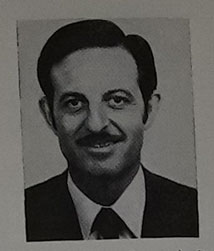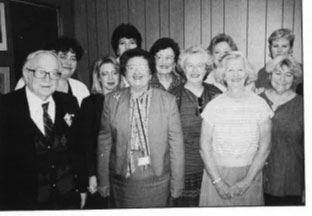In June 1970 Rabbi J Newman accepted the call and there was a dignified formal installation with Rabbi Duschinsky, the Av Beth Din and a press conference. It is not impossible that his decision to move to the more liberal Cape from Johannesburg was the result of his dissatisfaction at being criticised four years previously by the Johannesburg Beth Din for being polite although the Ethics of the Fathers teaches that courtesy precedes Torah. When Temple Shalom turned 21, it sent invitations to 21 Orthodox rabbis - only two responded, declining, but congratulating it on the milestone, one being Rabbi Newman of the Waverley Synagogue. The Beth Din objected and contacted all congregations stating that no recognition was to be given to representatives of Reform, whether lay or cleric, especially by rabbis, ministers and lay leaders. “Social courtesies must not be allowed to supersede considerations of basic religious principles” they wrote.[i]
This certainly was not the view of the London Jewish Chronicle which published an editorial headed ‘RELIGIOUS APARTHEID” blasting the Johannesburg Beth Din and saying that its stance was a departure from basic Jewish tradition and discourtesy was an impediment to truth.
Divergence was natural, for men were diverse. A healthy Jewish community needs Liberals and reformers, no less than Orthodox moderates and orthodox ultras. But damage is done and Judaism generally is the loser when one group insists that it alone is the sole custodian of the true faith.
The opinions of the British Chief Rabbi and Anglo-Jewry no longer mattered as South Africa had withdrawn from the British Commonwealth in 1961 after pressure from member states against its apartheid policies. Cutting itself off from developments overseas, South African Jewry increasingly withdrew into an increasingly narrow-minded laager as apartheid resulted in an increasingly isolated country.
Rabbi Newman soon got caught up in the problems inherent in secular education - 50% of Jewish pupils at Sea Point Junior School received no Hebrew education. This danger to their Jewish identity was exacerbated through the education system implemented by the strictly Calvinist apartheid government. Called Christian National Education, it laid down to teachers that Christian religious instruction was to be the key subject in school and was to determine the spirit and direction of all subjects. The Minister of National Education told the Transvaal National Party Congress in October 1971 that while he could not speed up the implementation of Christian-National Education in South African schools, he would see to it that the policy would be in full force throughout the country very soon. The system was instituted in the Transvaal in 1973, and in the rest of the country in 1974[ii] This had serious implications on Jewish children. Lack of Jewish education combined with Christian education could lead to indoctrination in Christianity resulting in assimilation and the concerned congregation asked Rabbi Newman to find out if any contact had been made with those schools. They also wrote to the Board of Education to request an investigation and to consider arranging Jewish instruction at secular senior schools in Sea Point (28.6.1972).

Rabbi Newman then convened a meeting of communal bodies to deal with the problem of Christocentric education, Solly Kessler from the Jewish Board of Deputies told them that religious education was a compulsory non-examination subject at all government schools, and the syllabus covered both the Old and the New Testament but the new education act stressed that teachers were to place emphasis on teaching Christianity. Previously no provision had been made for gainfully occupying scholars who chose to withdraw from those classes and it was not practical to provide them with religious instruction. The Board had circularised Jewish parents to inform them of their right to withdraw their children from Christocentric education but some were scared that their children would be victimised or discriminated against if they did not attend those classes. At one time Sea Point Boys Junior School and certain other schools had allowed Jewish ministers and laymen to give instructions with payments from the Board of Education, the Reform Congregation and G&SPHC. When the Board of Deputies suggested that Jewish parents should contribute money for Jewish teachers, the parents were not in favour of doing so (29.5.1974). The Board then approached the Minister of National Education pointing out that Jews, as tax payers, should be entitled to their own Religious Instruction teachers paid for by the state who would teach Judaism to the Jewish learners while the Christian pupils were having their own classes. The Minister responded that he did not approve of any teachers other than their own giving classes (13.2.1974).
Rabbi Newman sent letters to all the congregants and a full-page announcement in heavy black type was placed in the 1974 Rosh Hashanah Bulletin.
THE PROBLEM OF CHRISTO-CENTRIC EDUCATION IN PUBLIC SCHOOLS
Parents of Children of School-going Age please read this.
He warned parents of the decision by Governmental authorities to intensify Christian religious education in public schools. It would be the duty of school principals to ensure that all scholars would receive instruction and indoctrination towards Christianity. He advised parents to ask for their children to be exempted from religious instruction or to enrol their child in a Jewish day school or find ways and means to fill the scholar’s time with Jewish subjects during religious instruction at school.
The Jewish community responded in two ways. They moved their children to the Jewish day schools - Weizmann numbers soared – and the Cape Jewish Board of Deputies under the chairmanship of G&SPHC member Gerald Kleinman succeeded in bringing a Religious Instruction programme into the government schools which Jewish children could attend while the Christian children had their own classes. It was only in the Cape that such permission was granted. Rabbi David Rosen helped write the syllabus.

Gerald Kleinman
The G&SPHC could take pride in this. Because of its concern for what was happening in Sea Point schools a very successful Religious Instruction programme came into being in Cape Town schools, only coming to an end when most Jewish children were enrolled in Jewish day schools, leaving too few learners in government schools to make it worthwhile sending in a teacher.

Religious Instruction Seminar: Willie Katz with some of the teachers, Brenda Gordon, Felicity Sandler, Doreen Wingerin, Michelle Chait, Bertha Sherman, Phyllis Friedlander ( UJW), Sybil Castle, Fern Sacks, Debbie Court, Judy Bagraim
Education and Israel occupied Rabbi Newman more than South African politics. Rabbi Newman recalled giving sermons on the contributions made to the Zionist cause on the yahrzeits of Herzl, Jabotinsky and Bialik, trying not to be partisan. After the service, however, one person complained that by mentioning Jabotinsky next to Herzl, he denigrated Herzl. The next person complained that he had not done justice to Jabotinsky who had done more than anyone else to further the cause. At least, he concluded, in Sea Point people listened, thought, felt and cared. He wrote that they rejoiced with the people of Israel on happy occasions on their achievements, as they had wept and mourned for the large numbers of victims who fell during this time.
The synagogue’s 40th anniversary was overshadowed by national and international concerns. His Worship the Mayor of Cape Town Councillor David Bloomberg sent a message full of praise for the congregation and the Jewish community of Cape Town but their President Abe Margolis in his New Year’s message had more pressing issues on his mind. Zmira Cohen was at shul just before Minchah on that fateful Yom Kippur in 1973 when Rabbi Newman broke the devastating news to the stunned congregation of the outbreak of the Yom Kippur War. Never before or since did she feel such a sense of unity d’vekut within the congregation during the Minchah and Ne’ilah that followed.
President Margolis had written in their anniversary edition of their Rosh Hashanah bulletin: “Worst of all, however, was the sad experience we had endured the previous year. The Yom Kippur War had claimed a terrible toll of Jewish lives. Israel was caught unprepared, having nurtured the hopeful belief that the Arabs would not start another war so soon. Yet in spite of all that, we dare not close our eyes to the miraculous. The unity of Israel and the Jewish people has once more so forcibly displayed itself particularly immediately after the commencement of the Yom Kippur War.” But he pointed to other dangers to the Jewish community.
Assimilation, Christo-centric education in schools, the weakening of the Jewish home and religious life, the apathy and dissatisfaction of our youth, has been subjects of constant debate, discussion and soul searching. There can be no future for our community without Judaism and there can be no Judaism without learning. We require young married men to come forward and serve on our management committee.
Unfortunately, the locally born younger members had shown no desire to join the Chevra Lomdei Torah which held six shiurim a week covering various aspects of Jewish sources. Rabbi Newman suggested English study circles to attract the younger members of the congregation without much success. He believed that a Beit Hamedrash had always been regarded with more veneration than a Beth Haknesset had been, because Judaism could not envision a House of Prayer without an active House of Studies.
Rabbi Newman resigned, having been appointed to the College for Judaism in Israel as well as receiving an invitation to serve on the Beth Din by Rabbi Shlomo Goren, later Chief Rabbi of Tel Aviv.
[i] Manoim, I, op cit, 289-291
[ii] Daily News, 6 October 1971, IN Hofmeyr, Jane Mary, An examination of the influence of Christian national education on the principles underlying white and black education in South Africa 1948 - 1982
AN EXAMINATION OF THE INFLUENCE OF CHRISTIAN ...146.141.12.21 › bitstream › handle › Hofmeyr J M 1982-001
